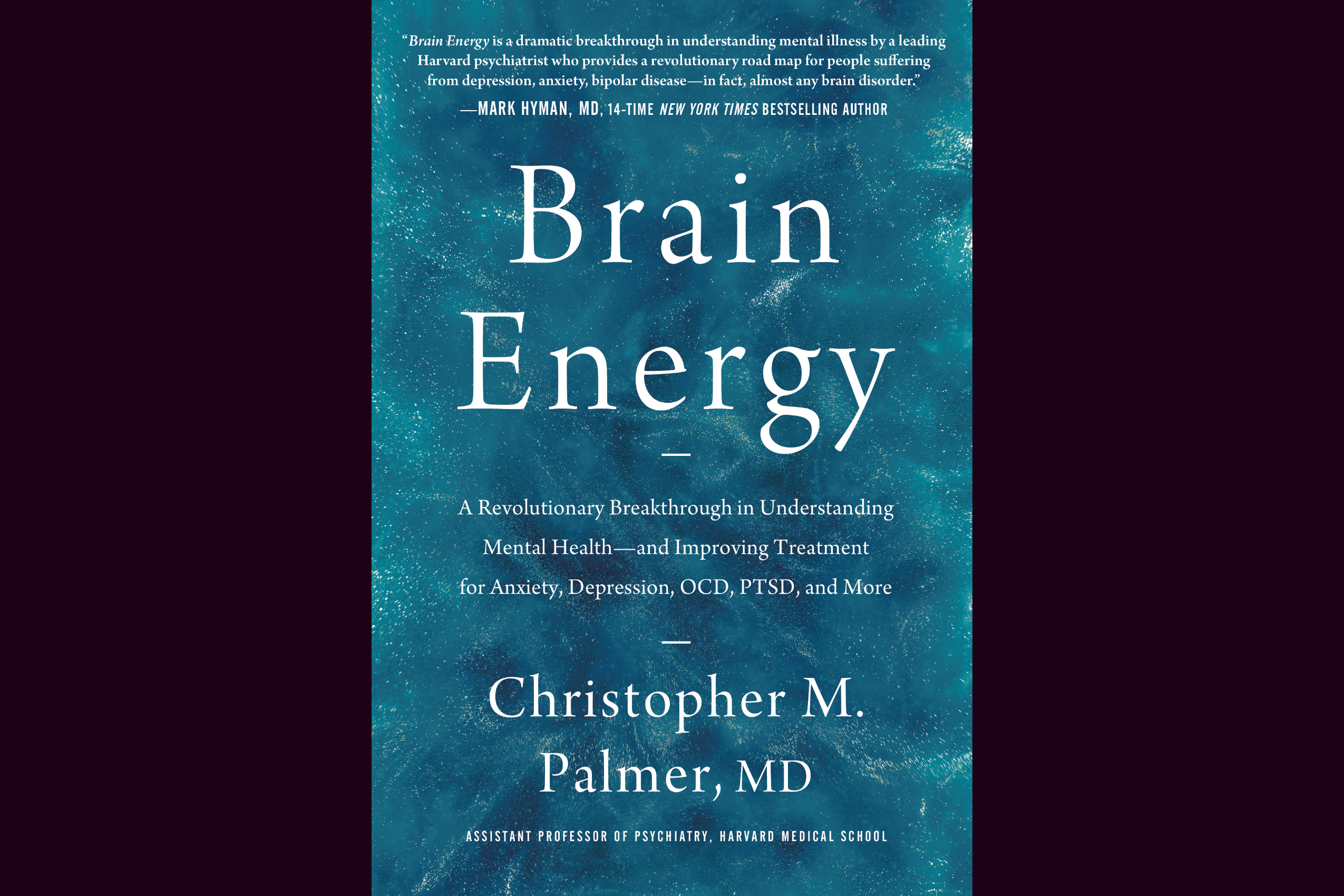Mental illnesses are on the rise in the U.S. – and in Texas, like much of the country, there’s a shortage of mental health practitioners to meet the growing demand.
Psychiatric conditions are typically thought of as distinct from physical conditions like heart disease or diabetes. But what if physical and mental health are much more closely related than previously thought? Some research suggests that mental illnesses may in fact be linked to metabolic issues. Harvard psychiatrist Christopher Palmer explores this hypothesis in his new book, “Brain Energy.”
This transcript has been edited lightly for clarity:
Texas Standard: I want to make sure I’ve got this right: You say mental illnesses are actually metabolic illnesses of the brain – before we dig into how that works, what do you mean by metabolic illnesses?
Christopher Palmer: It’s a great question, and I think that’s one of the complexities of the theory. At the end of the day, metabolism is a complicated thing. It is fundamental to all living organisms. It’s fundamental to how our cells function. But at the same time, it’s not so complicated because illnesses like diabetes, obesity and heart attacks are all metabolic disorders.
Yeah, that’s what I think a lot of people think of first.
And when you think about that, you know, there are things people can do to address those and prevent those and or reduce those. And things like diet and exercise is what everybody thinks of first. But interestingly, psychological and social factors also play a role in those metabolic disorders. Things like relationships, loneliness and stress actually have an effect on whether people have heart attacks or whether they have obesity. And so I think we need to integrate the way we think about mental health and metabolic health.
This is really, really fascinating. But what I want to understand is, are you talking about the mechanism that perhaps affects mental health being affected as if it were a metabolic illness? Or are you suggesting that mental illness actually has as its root cause some kind of metabolic condition?
I am suggesting that the root cause of all mental disorders actually is metabolic in nature. And so, you know, right now, if you ask a psychiatrist what exactly causes the mental illness, they’ll probably tell you, no one knows for sure; it’s too complicated. But instead, they’ll tell you about some different factors that are involved: things like neurotransmitters, hormones, genetics – but also trauma and stress. If you ask them, how do all those things fit together to result in mental illness? They’ll say, no one knows.
What I’m saying is that if you take a bigger picture, if you see the forest from the trees, you can actually begin to see how all of those things are connected: neurotransmitters, hormones, genetics, trauma and stress. And you can put them together by understanding that they are all affecting metabolism. You can furthermore understand how metabolic problems in the brain can result in symptoms of mental illness.
Let me make sure I understand this: When we often talk about stress and that sort of thing, we think of externalities, which tend to exacerbate metabolic conditions. Are you saying that we’re talking about externalities primarily having that impact? Or are you saying that there is some kind of dysfunction within the body that causes, you know, the brain to improperly, say, respond to different stimuli? What exactly are you saying here?
So what I’m saying is that for people with chronic mental disorders – whether it’s an anxiety disorder or depression, but also bipolar disorder and schizophrenia – parts of their brain are metabolically impaired. And what that means is that those parts of their brain are not getting enough energy from food, basically. And what happens is that when a cell is metabolically compromised, it doesn’t function properly. And it is that dysfunction in those brain cells that ultimately results in what we call symptoms of mental illness, whether it’s feeling depressed for no reason or having a panic attack for no reason, but also even hallucinating or having delusions.
So does it logically stand, then, that if we change our diet, we can actually reduce the incidence of mental illness in our country? Does that logically follow, or am I missing something?
I think diet is a really important factor – and diet, in fact, will address mental illness for some people – but diet isn’t the only thing involved in metabolism. So, for example, hormones play a critical role in metabolism – cortisol and thyroid hormone, for instance. And if you have low levels of thyroid hormone, you’re going to have metabolic problems. Those people are more likely to gain weight, have heart attacks, become diabetic. But those people are also more likely to develop mental disorders. And so sometimes the problem is hormonal; sometimes the problem is stress or problems with sleep or a lack of exercise. The good news, though, is that these are actually fairly straightforward things that most people have already heard of. It’s not rocket science; it’s not brand-new stuff. We can do things today to reverse mental disorders in, I believe, most people.
Let me ask about what some of your colleagues and peers have to say about this. I mean, obviously, a lot of people are prescribed psychotropic medications. I’m wondering if some people are concerned that your message might cause people to take this less seriously or to see it as less sort of biologically based and more sort of based on the world around them: what we’re eating and that kind of thing, maybe. Well, you understand the critique that some might have for this approach.
I do. I mean, so one thing that I’ll say is that I am not just inventing this out of thin air. This is actually based on centuries and centuries of clinical observations. Scientists and researchers knew about the connections between diabetes and mental illness in the 1800s, and it’s based on decades of neuroscience, metabolic, psychiatric research. These connections go far and deep. So in that sense, most of the leading professionals are not going to be able to really question this because it simply integrates all of the research that we’ve got.
But your question about “are these serious disorders? If it’s as simple as diet, then you’re not taking it seriously.” You know, a heart attack is actually a really serious thing. It kills people. Dying is a pretty serious thing, and that is a metabolic problem that is largely driven by environment. Now, environment is more than just diet. Yes, diet plays a key and powerful role, but infections can play a role, and stress and sleep and substance use, all of those things can play a role in heart attacks. And what I’m saying is that the same processes that result in somebody dying of a heart attack, when those processes happen in the brain, instead they result in what we call symptoms of mental illness.
Where does experimentation on this front stand currently? What’s the follow-up here before there can be intervention therapies, or are those interventions already happening?
So some of these interventions are tried and true interventions. Exercise for mental health has been studied for decades. Sleep regulation, getting good sleep – everybody knows that is critical for mental health, but also metabolic health. Managing substance use like smoking cigarettes – we know that plays a role in both metabolic health like heart attacks, but also in mental health. And so some of the treatments are tried and true standards that everybody knows about.
There’s a new emerging field called nutritional psychiatry in which we are using dietary interventions like the Mediterranean diet or ketogenic diet to improve mental health in people. And that research, it’s interesting because, you know, the ketogenic diet, although most people have heard about it as kind of a trendy weight loss diet, it’s actually a 100-year-old evidence-based treatment for epilepsy. The ketogenic diet can stop seizures even when medications fail to. And the reason that’s important is because we use epilepsy treatments in psychiatry every day in tens of millions of people. A lot of the pills that people take for psychiatric conditions are actually epilepsy treatments, things like Valium and Xanax and Klonopin. And so using an epilepsy treatment for mental disorders is actually not all that unusual and not that surprising.
How do you see this research changing the approach to mental health disorders more broadly? Is the future of mental health treatment going to focus more on dietary interventions and exercise and that sort of thing, do you think?
I absolutely think it should. I think this theory has the potential to be highly disruptive. That’s a term often used in the business world, like when the personal computer comes out and puts the typewriters out of business. I do think this theory has the potential to completely disrupt the mental health field and offer entirely new ways to understand and treat mental disorders. And it comes with tremendous hope.
And I just want to say, this is not theoretical. I and other researchers have reported dozens of patients, in the peer-reviewed medical literature, patients who have chronic disabling bipolar disorder and schizophrenia, who are now in remission, sometimes off medications. They are living entirely new lives. This is a new day in the mental health field.
Well, this is going to give a lot of folks a lot of hope, obviously. But how do you account for the fact that this has not taken off, given the decades that you’re citing of research along the same lines that tie it together? What sort of reception do you expect from other mental health professionals?
You know, the good news is that many leading psychiatrists and neuroscientists have actually publicly endorsed the theory and the book, which is great and encouraging. I think others are taken aback because they’re not aware of this science. They’ve never seen the science and the research put together in the way that I put it together. And I think that is critical, that it’s really about looking at something that’s been in front of us all along, but looking at it with a new lens or a new perspective. It’s rearranging the puzzle pieces to show a different answer. And I am hopeful that it will transform the mental health field.















